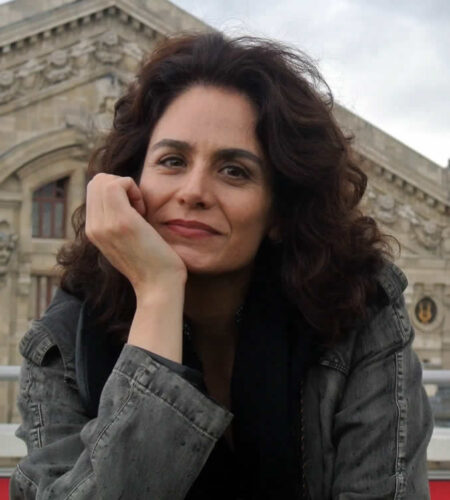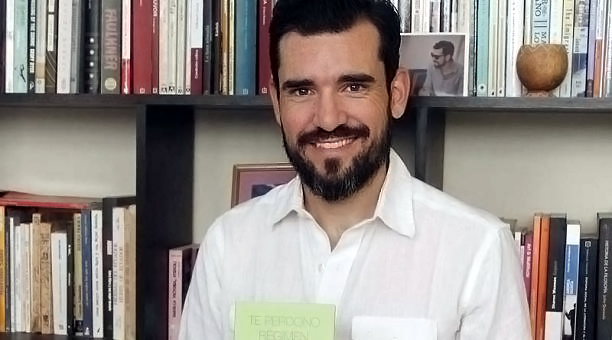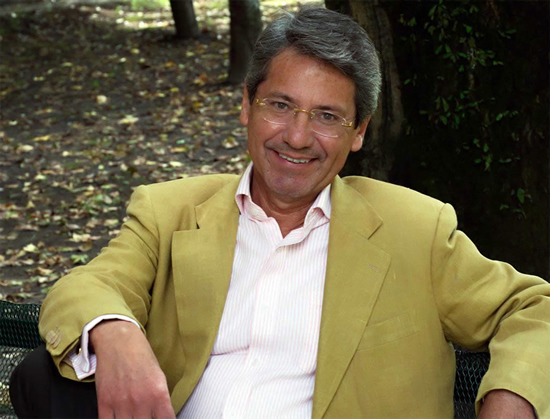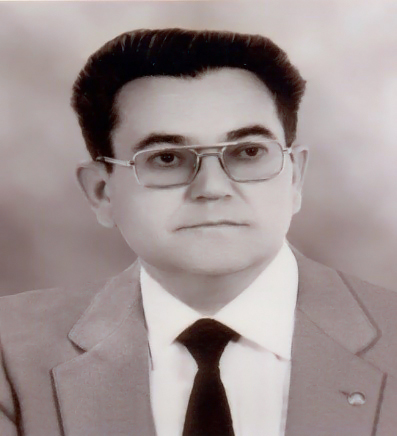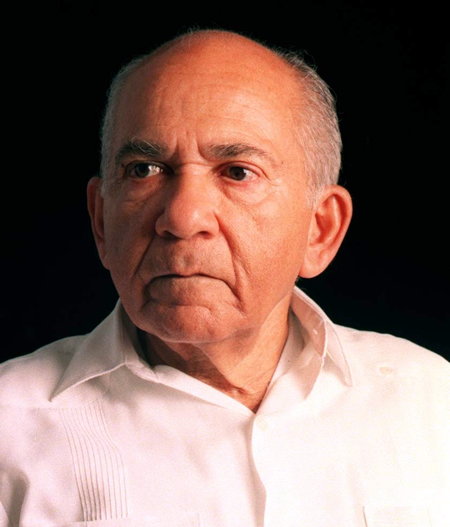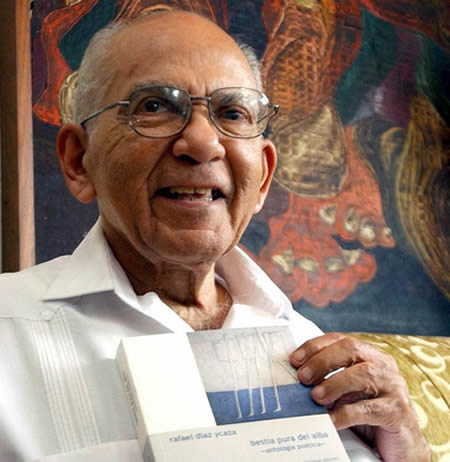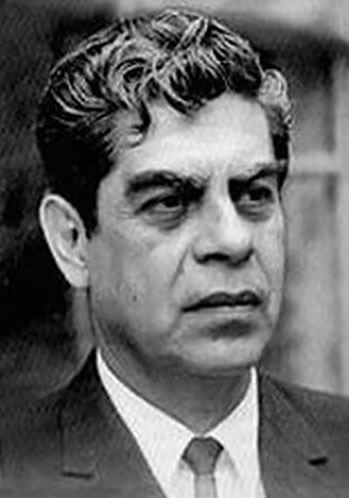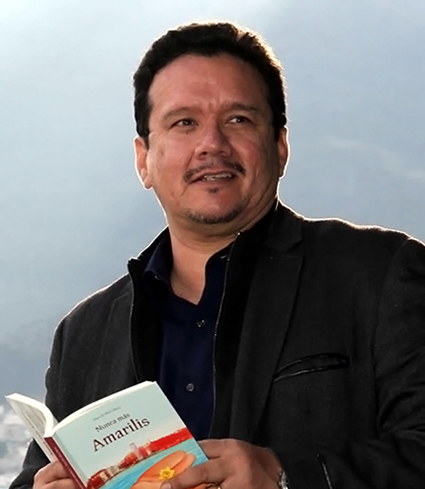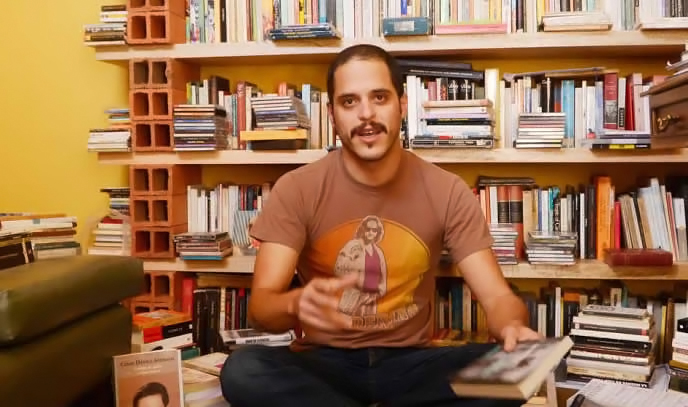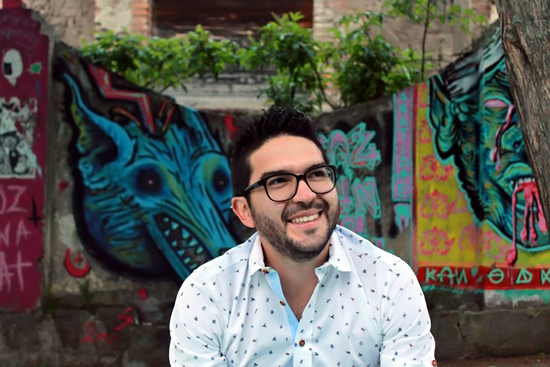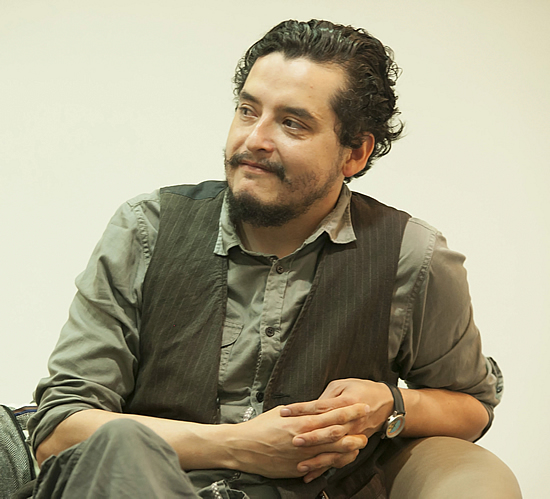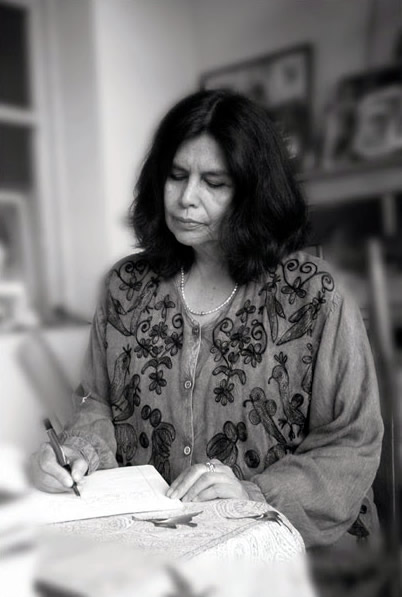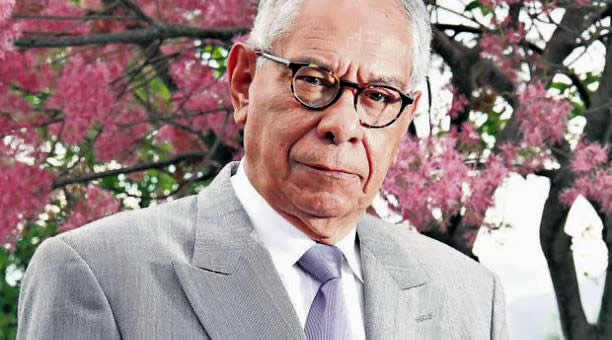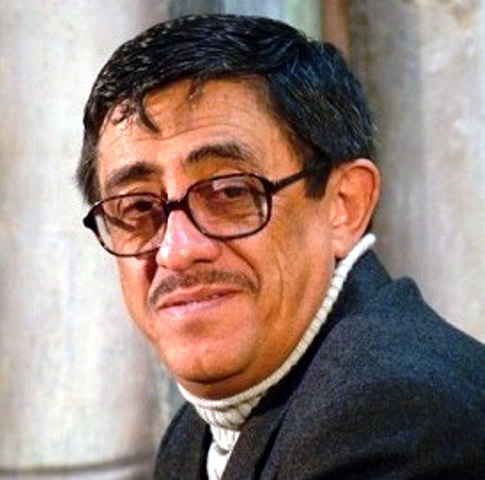Gabriela Alemán is an Ecuadorian writer, translator, literary critic, academic and professor. She was born in Rio de Janeiro to Ecuadorian parents on September 30, 1968. After living in several countries in her youth, she settled in Quito, Ecuador. Alemán studied translation at University of Cambridge (UK), received a master’s in Latin American Literature at Simon Bolivar Andean University (Ecuador) and obtained a doctorate at Tulane University (New Orleans). In 2006, she received the Guggenheim scholarship in Film, Video and Radio Studies. Alemán won First Place at the CIESPAL de Crónica Awards for her article “Los limones del huerto de Elisabeth” (2014), and the Joaquín Gallegos Lara Prize for her short story collection La Muerte silba un blues (2014). Her best known novel is Poso Wells (2007; translated into English by Dick Cluster, 2018). The Paris Review, The New Yorker, and Los Angeles Review of Books have published commentaries and interviews about the novel. Alemán teaches at the University of San Francisco, Quito and at Tulane University.
Continue reading “Gabriela Alemán”Category: Ecuadorian Novelists
Ecuadorian novelists, including stories, translations, bibliographies, biographies, interviews, articles, and much more. Novelists from Ecuador in one place.
Daniela Alcívar Bellolio
Daniela Alcívar Bellolio is an Ecuadorian writer, literary critic and feminist. She was born in Guayaquil, Ecuador on March 3, 1982. Alcívar’s first two books were published in 2016, her short story collection Para esta mañana diáfana, and her essay collection Pararrayos, which she wrote while living in Buenos Aires, Argentina. In 2018, her novel Siberia was awarded the Joaquín Gallegos Lara Prize for best novel of the year and also received honorable mention at the La Linares Prize.
Continue reading “Daniela Alcívar Bellolio”Salvador Izquierdo
Salvador Izquierdo, pseudonym of Jorge Izquierdo Salvador (London, UK, 1980) is an Ecuadorian writer. He has dual British and Ecuadorian citizenship. He earned a PhD in Latin American studies from the University of British Columbia, Vancouver. His first novella “El deslenguado de Portete” (2006) was the Second Prize winner of the Medardo Ángel Silva Award. Along with Javier Izquierdo, he is the co-screenwriter of the films “Un Secreto en la Caja” (2016) and “Panamá” (2019). In 2019, Izquierdo’s novel “El nuevo Zaldumbide” [The New Zaldumbide] was awarded the Joaquín Gallegos Lara National Fiction Prize for best novel of the year.
Continue reading “Salvador Izquierdo”Raúl Vallejo
Raúl Vallejo, born César Raúl Enrique Vallejo Corral (Manta, June 28, 1959) is an Ecuadorian novelist, short story writer, poet, politician and academic. He has served as the Minister of Education in the administrations of presidents Rodrigo Borja Cevallos, Alfredo Palacio and Rafael Correa, who also named him Minister of Culture and Patrimony. In the realm of literature, he is one of today’s most prolific writers, and has won many national and international awards, such as the Royal Spanish Academy Award (Spain), José Lezama Lima Poetry Prize (Cuba). In 1999 his books Huellas de amor eterno (short stories) won the Aurelio Espinosa Pólit Prize and Acoso Textual (a novel) won his second Joaquín Gallegos Lara Prize.
Continue reading “Raúl Vallejo”Juan Manuel Rodríguez López
Juan Manuel Rodríguez López is a novelist, short story writer, literary critic, columnist and professor. Born in Bilbao, Spain in 1945, Rodríguez is a naturalized Ecuadorian citizen and has lived in Quito most of his adult life. Rodríguez’ award-winning fiction includes the novels El poder de los vencidos (2003), El pulso de la nada (1996), and El Espantapájaros (1990 & 1995). In 1990, his short story collection Fricciones won the prestigious Aurelio Espinosa Pólit Prize.
Continue reading “Juan Manuel Rodríguez López”Ecuadorian poet and novelist Rafael Díaz Ycaza reading from his poetry and prose
Ecuadorian poet and novelist Rafael Díaz Ycaza reading from his poetry and prose. Archive of Hispanic Literature on Tape (Library of Congress, Control Number 93842308), Recorded Mar. 27, 1977, in the Library of Congress Recording Laboratory, Studio B, Washington, D.C. Recorded for the Archive of Hispanic Literature on Tape. Production level cataloging. Also available in digital form on the Library of Congress Web site.
Go to RecordingRafael Díaz Ycaza
Rafael Díaz Ycaza (Guayaquil, October 28, 1925 – August 28, 2013) was a poet, novelist, short story writer and columnist. His notable works include poetry collections such as “Statues at Sea” (1946), “Botella al Mar” (1964), and “Zona Prohibida” (1972), each resonating with his lyrical style and profound imagery. Among his novels are “Los Rostros del Miedo” (1962) and “Los Prisioneros de la Noche” (1967). Beyond his literary achievements, Díaz Ycaza was honored with various awards and recognitions, including the Aurelio Espinosa Pólit Prize (1985)” and the “José de la Cuadra National Short Story Prize (1967). In 2011, Ecuador’s President Rafael Correa awarded Díaz with the the nation’s highest literary distinction, the Eugenio Espejo National Prize, for his lifetime of literary work.
Continue reading “Rafael Díaz Ycaza”“His book [Zona prohibida] was like a bible for the youth of my generation, especially for its social poetry.”
Sonia Manzano (Poet) – quoted in “Rafael Díaz Ycaza, el hombre que dedica su vida a las letras,” El UNIVERSO, Sept 2, 2011.
Enrique Gil Gilbert
Enrique Gil Gilbert (Guayaquil, July 8, 1912 – Ibidem, February, 21, 1973) was an Ecuadorian novelist, short story writer, nonfiction writer, politician and teacher. He was the youngest member of the “Guayaquil Group,” a group of realist writers of the 1930s Ecuador. At only eighteen years of age he co-wrote “Los que se van, cuentos del cholo y del motuvio“ (1930) with Demetrio Aguilera Malta and Joaquín Gallegos Lara – a book of short stories which marked the beginning of literary realism in Ecuador. His most famous work is his only novel, “Nuestro pan” (1942), which was translated into English in 1943 as “Our Daily Bread.” His other noteworthy story collections include: “Yunga,” “Relatos de Emanuel” [Tales of Emanuel], and “La cabeza de un niño en un tacho de basura” [The Head of a Child in a Trash Can].
Continue reading “Enrique Gil Gilbert”Marcelo Báez
Marcelo Rafael Báez Meza (Guayaquil, April 24, 1969) is an Ecuadorian poet, novelist, translator, and film critic. He has earned a myriad of awards for his books. He won first place in the National Literature Contest of the House of Ecuadorian Culture on three occasions (1997, 2005 and 2013). His prize-winning novels include “Catador de arenas” (2010) and “Nunca más Amarilis” (2018). In 2012 his poetry book “El mismo mar de todas Las Habanas” won the Aurelio Espinosa Pólit Prize. He is currently the dean of the Art, Design and Audiovisual Communication Department of the Superior Polytechnic School of the Littoral (ESPOL) in Guayaquil.
Continue reading “Marcelo Báez”Luis Borja Corral
Luis Borja Corral (Quito, 1981) is an attorney and writer. Recurring themes in his works include sexuality, death, marginalization and love. “Los funámbulos” (2012), his first novel, was published digitally. His second novel “Pequeños palacios en el pecho” (2014), won the Aurelio Espinosa Pólit National Literary Prize.
Continue reading “Luis Borja Corral”Santiago Peña Bossano
Santiago Peña Bossano is an Ecuadorian writer. He was born in Quito in 1990. His nonfiction book Estética de la indolencia (2015) won the Aurelio Espinosa Pólit Prize. He received a masters in Literature from the Complutense University of Madrid. He is a professor of Hispanic Literature at the Pontifical Catholic University of Ecuador. He is the director of Cactus Pink, a publisher in Quito. He teaches creative writing at the Kafka Escuela de Escritores (Kafka School for Writers). His novel Mindotown was published in 2017.
Continue reading “Santiago Peña Bossano”Roberto Ramírez Paredes
Roberto Ramírez Paredes (Quito, 1982) is an Ecuadorian author and university professor. His literary journey began with his debut novel “La ruta de las imprentas” in 2015, followed by the critically acclaimed “No somos tu clase de gente” in 2018, which won the Aurelio Espinosa Pólit National Literature Prize. His later works, “Evangelio del detective formidable” (2021) and “Tamia, el universo” (2022), further established him as a prominent figure in contemporary literature. Apart from his novels, Paredes has written for notable Ecuadorian newspapers, including El Comercio and Hoy, and has had his short stories published in various anthologies. Currently, he is sharing his literary expertise and knowledge as a professor at the School of Literature at the University of the Arts (UArtes)in Ecuador.
Continue reading “Roberto Ramírez Paredes”Natasha Salguero
Natasha Salguero Bravo (Quito, October 2, 1952) is a prominent Ecuadorian novelist, poet, journalist, and nonfiction writer. In 1989, she became the first woman to win the prestigious Aurelio Espinosa Pólit National Literature Prize for her novel Azulinaciones, which she submitted to the contest under a male pseudonym. That same year, she won the Gabriela Mistral Poetry Prize. Her work, known for exploring themes of feminism, social decay, and political repression, has been widely translated and featured in international anthologies, establishing her as a leading voice in Ecuadorian literature.
Continue reading “Natasha Salguero”Marcelo Lalama Basante
Marcelo Lalama Basante (Riobamba, 1942 – Quito, 2017) was an Ecuadorian novelist and a medical doctor. His debut novel “Los Nazarenos” won the Aurelio Espinoza Pólit Prize in the year 2000 and the Joaquín Gallegos Lara Prize in 2001. His other works include “Santamaría de los Volcanes” (awarded First Prize in Literature from the Central University of Ecuador in 2008) and “Hospital Real de la Misericordia” (2013).
Continue reading “Marcelo Lalama Basante”Jorge Dávila Vázquez
Jorge Dávila Vázquez is a writer, professor and film critic. Dávila Vázquez was born on February 14, 1947 in Cuenca, Ecuador. Dávila Vázquez has written novels, plays, short stories, poetry and nonfiction. He is a two-time recipient of the prestigious Aurelio Espinosa Pólit Prize, for his experimental novel María Joaquina en la vida y en la muerte (1976), and for his short story collection Este mundo es el camino (1980). His short story book El libro de los sueños (2001) won the Joaquín Gallegos Lara Prize. In 2016, Dávila was awarded Ecuador’s top literary prize, the Eugenio Espejo Award.
Continue reading “Jorge Dávila Vázquez”
